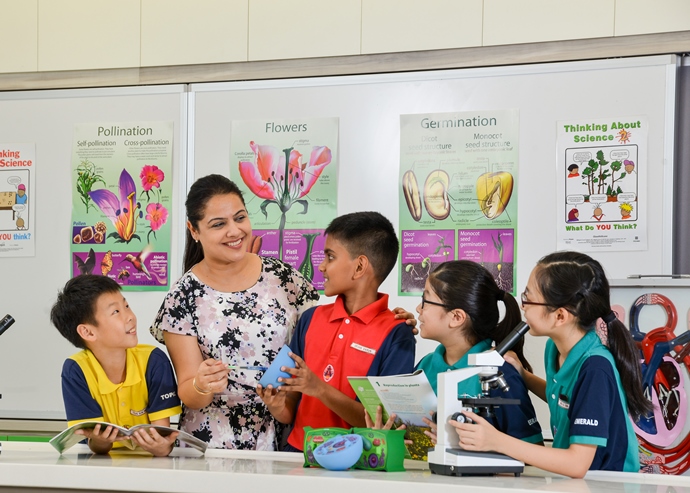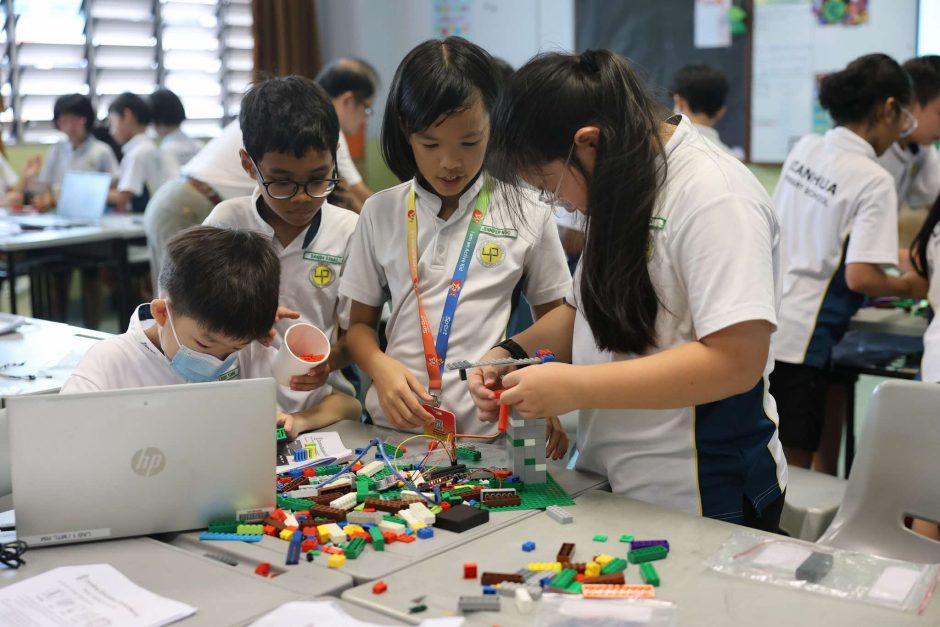How often do we see science experiments wheeled around the school on mobile carts, where students can explore and tinker to their hearts’ content?
At Yusof Ishak Secondary School (YISS) that is just one of the unique methods used to expose students to the wonderous world of STEM – Science, Technology, Engineering and Mathematics. In 2022, the school will have a new campus to expand on their ideas, as they welcome a new batch of Secondary 1 students.
Sparking students’ curiosity in STEM
YISS teachers came up with the idea of “experiment arcades”, which are mobile booths containing small-scale science experiments. The idea was mooted by Mr Donavan Lau, the school’s Lead Teacher in Physics, and today the programme is known as ‘Experiment Excites’. Mr Lau says, “We want to challenge conventional thinking that science can only be learnt in classrooms or labs, because it can take place anywhere.”
.jpg)
The Experiment Excite carts are specially designed to encourage group work and collaboration amongst students.
These experiments are extensions of topics taught in class, such as electricity in Physics or the diversity of matter in Lower Secondary Science. For example, in an activity involving water quality, data loggers are placed in the carts for students to take measurements from water samples collected from all around the school compound before bringing their results back to class for discussions.
Teachers provide learning logs in hardcopy or on the Student Learning Space (SLS) for students to reflect on what they have learnt from the activity. These are not graded by teachers but are meant to promote self-directed learning and collaboration among students.
In 2022, the school’s new campus in Punggol will allow the teachers to set up more experiment arcades and include more spaces for students to gather and exchange ideas. “We believe these would spark students’ curiosity,” says Mrs Maureen Saw, Principal of YISS. “We want to provide more opportunities to help students see that they can discover scientific concepts in more ways than one.”
Kindling the desire to learn more
‘Experiment Excites’ is but one of many initiatives that YISS has developed to generate curiosity and a desire to learn more among its students. “It is important that we are able to help students draw connections between what they have learnt in the syllabus to real-life situations,” says Ms Tan Sui Linn, Subject Head of Chemistry.
Another way in which the school embeds real-world significance into the lessons and programmes is through its urban farming programme. Here, students learn about the importance of creating a sustainable future and the need for Singapore to realise its ‘30 by 30’ target – to produce 30 per cent of its nutritional needs locally and sustainably by 2030.
Mr Lau says, “We always think about what will be relevant for the students not only for their personal growth, but also how they can contribute towards Singapore’s development as well.”
Every class in YISS adopts a vegetable plot when they start Secondary 1. Students can grow crops such as lettuce and kangkong at their plot.

Students pick up the basics of planting and maintaining crops before taking over the plot as a class.
“This fosters a spirit of ownership and giving back,” explains Ms Tan. “Students maintain their vegetable plot and the harvest is donated to vulnerable residents living in our school’s neighbourhood.”
With the new campus, the school plans to expand the scope and scale of the urban farming programme, with plans to incorporate technology to improve on its programmes.
The school will also double down on its commitment to promote STEM with its Applied Learning Programme known as S4TEM@YI (pronounced: STEM at YI). It will feature school-wide activities and mini-projects related to sustainability and smart cities, spread across themes such as food sustainability, coding and robotics.
For example, students can design smart urban farming solutions like automatic-watering systems for microgreens. “This technology is readily available in the market, but we want the students to appreciate and understand the logic of the process and create innovative solutions of their own,” says Ms Tan.
Developing a thirst for exploration
With new beginnings abound for YISS, the stage is set for students to learn “in the classroom by curricular connections, and out of the classroom by exploration”, as Mrs Saw puts it.
Throughout the school year, there are multiple STEM-related learning experiences that students are progressively introduced to. Students have opportunities to explore the fields of aeronautics, nanotechnology and Artificial Intelligence through seminars and hands-on activities.
The school partners experts from industry such as research scientists from A*STAR, and Institutes of Higher Learning to conduct these programmes. Some of the hands-on activities include working with gliders and drones or even learning to programme robots.
.jpg)
Students can learn how to programme a robot as part of the school’s STEM initiatives.
For students who are particularly passionate in STEM, they can consider CCAs such as the STEM Club or Robotics. They will join the ranks of YISS alumni who have been exposed to coding techniques, computational logic and biochemistry – some have even represented the school at national competitions.
“We connect STEM learning to our school’s overall curriculum, yet with space and scope for students to collaboratively ideate, explore and prototype their creative ideas,” says Ms Tan. “The wide variety of programmes encourages self-directed learning, urging students to find out more, developing a thirst for exploration.”
Curiosity, resilience, entrepreneurial spirit and creativity – these are habits that have been identified by the school as crucial traits that students need to tackle the challenges of the future.
“Ultimately, we want our students to get curious about ‘innovation’ and break free from constraints,” says Mr Lau. “One question we often ask them is, based on what you already know, how can you apply these ideas in a way that benefits the lives of yourself and others?”



307a64a7a8a66eb2afccc900c73e6f2e.jpg)


